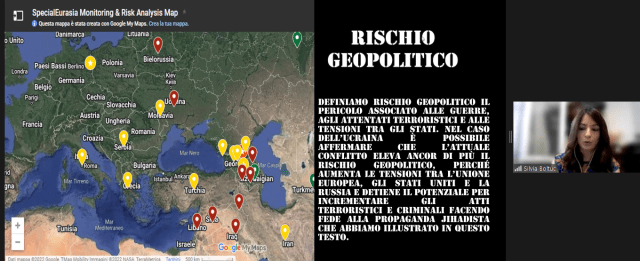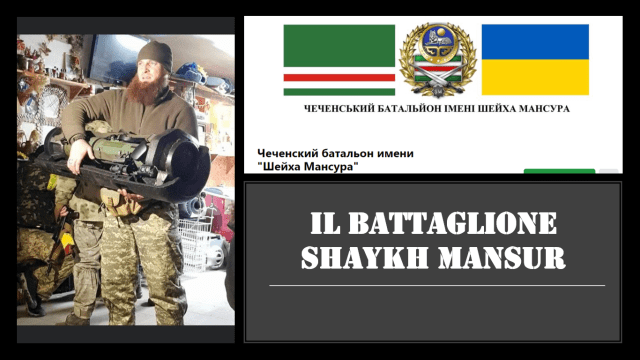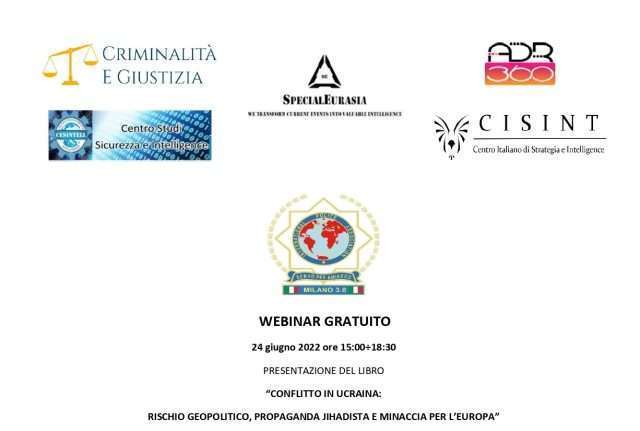Online book presentation “Conflict in Ukraine: geopolitical risk, jihadist propaganda and threat for Europe”: a summary
On June 24th, 2022, SpecialEurasia, in cooperation with Criminalità e Giustizia, CISINT, Cesintel, IPA, ADR 360 and CCMN, organised an online webinar to present the book “Conflict in Ukraine: geopolitical risk, jihadist propaganda and threat for Europe”.
Silvia Boltuc, SpecialEurasia managing director, Giuliano Bifolchi, PhD in Islamic Studies and SpecialEurasia research manager, and Daniele Garofalo, a senior analyst specialising in jihadist propaganda and terrorism, joined the event and presented their book “Conflict in Ukraine: geopolitical risk, jihadist propaganda and threat to Europe” edited by Enigma Edizioni. Professor Maurizio Valentini and Dr Sarah Bregante from Criminalità e Giustizia moderated the event.
The authors underlined in the book the geopolitical risk for Europe derived from the presence of foreign fighters in Ukrainian territory and the jihadist propaganda conveyed in different languages (English, Arabic, Russian) that labels the conflict between Moscow and Kyiv as an ‘opportunity’ for foreign fighters to obtain armaments and training thanks to Kyiv’s establishment of the ‘international legion’. The possible presence of foreign soldiers and mercenaries on the Ukraine soil might represent a threat to the entire European continent since, in 2021, Ukrainian President Zelensky signed a presidential decree which granted Ukrainian citizenship to those foreigners who support or fight among the ranks of the Ukrainian army or inside paramilitary groups operative in Donbas.
This research resulted from a constant monitoring activity that SpecialEurasia started since the beginning of the Ukraine conflict (or the Russian special military operations) thanks to SpecialEurasia projects Ukraine Crisis & Conflict and Monitoring Jihadist Propaganda & Terrorism. Inside the book, the reader might get acquainted with the main topics promoted by the jihadist propaganda supported by primary sources and images taken from different terrorist groups’ media channels.
In her presentation, Silvia Boltuc analysed the geopolitical context of the Ukrainian conflict, highlighting the strategic role of Ukraine in the Kremlin’s foreign policy and the European energy market and focusing on the most attractive Ukrainian regions about mineral resources and industrial potential, areas that today see the most remarkable military commitment of the Russian armed forces. Silvia Boltuc continues her explanation, outlining a brief chronology of the events that, from 2013 to today, have led to the Russian-Ukrainian military confrontation. In her conclusion, Silvia Boltuc emphasised that the Ukraine conflict might become a potential geopolitical risk for Europe and Italy due to foreign fighters and mercenaries’ presence in the Ukraine conflict who might use Western weapons and training to conduct terrorist attacks or criminal activities on European soil.

Giuliano Bifolchi focused on the connection between the Ukrainian conflict and the North Caucasus through the analysis of jihadist propaganda in the Russian language, with particular attention to the Vilayat Nokhchichoy of Imarat Kavkaz (Caucasus Emirate) and the study of Chechen armed groups operating in Ukraine such as the Dzhokhar Battalion Dudayev and the Shaykh Mansur Battalion. He stressed that in the book, the reader could familiarise themselves with the main elements of strategic communication used by the Chechen armed groups operating in Ukraine and by the Russian-language portals of opposition to the Kremlin that, for the terms used and the message conveyed can be defined as a related to North Caucasian terrorism. During the presentation, Giuliano Bifolchi shared images and videos of jihadist propaganda and Chechen and foreign battalions in Ukraine collected from Telegram channels, websites and other social media.

Daniele Garofalo provided an overview of the arguments used by the Islamic State, al-Qaïda and Hayat Tahrir al-Sham in their media and propaganda channels in which the Ukrainian conflict is presented as an opportunity to favour the destruction of Russia and Europe themselves and a war theatre where the group’s fighters can find weapons and gain military experience. In addition, Garofalo outlines which groups with anti-Russian propaganda could exploit the Ukrainian conflict to increase their terrorist activity in the Middle East and North Africa or open new fronts in Russia and the European context.

During the Q&A sections, the authors debated the impact of jihadist propaganda on the Arab-Muslim world, especially the Russian Muslim umma (community) and the strategy to influence ethnic minorities in the Russian Federation. Grave concern has arisen about the international dimension of the Ukraine conflict on social networks and media channels and how terrorist groups might use the conflict to organise their activities in Europe, the Middle East, Central Asia, the Caucasus, North Africa, and Sub-Saharian Africa.
It is possible to buy the book at the following link: “Conflitto in Ucraina: rischio geopolitico, propaganda jihadista e minaccia per l’Europa“

